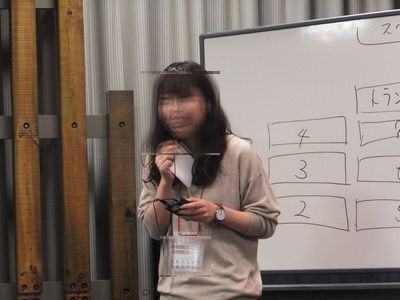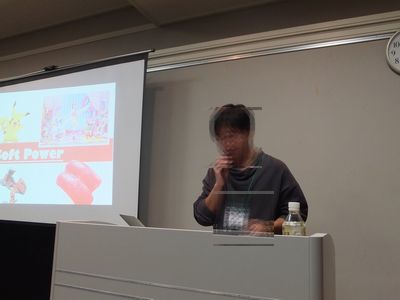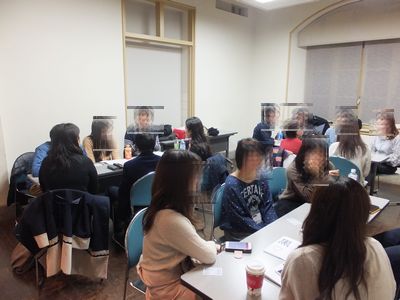第162回 WORKSHOP報告(11月18日) / 参加者70名
1.マテリアルの紹介 Sさん

2.マテリアルの紹介 Kさん

3.ディスカッション中の様子

:::::::::::::::::::::::::::::::::::::::::::::::::::::::::::::::::::::::::::::::
《 今回のworkshop 》
○workshop参加人数:70名(うち新人の方:7名)
○【前半】:Talk to strangers
○【後半】:Soft Power
:::::::::::::::::::::::::::::::::::::::::::::::::::::::::::::::::::::::::::::::::
みなさまこんばんは、E’s club幹事のKです。
11月18日(土) 開催の第162回workshopの詳細をお送りいたします。
今回は前半のマテリアルをSさん、 後半のマテリアルをKさんにご作成いただきました。
前半は”Talk to strangers”、後半は”Soft Power” というテーマでそれぞれディスカッションを行います。
前半のReferenceのリンク先にはTEDの動画があります 。
事前にご視聴をお願いいたします。( 動画の長さは11分53秒です。)
[今週のマテリアル]
≪FIRST HALF≫
Talk to strangers
Meeting someone for the first time, and don’t know what to talk about? Small talk can be used in order to build a positive relationship. Hopefully today’s topic help you break the ice with strangers.
・Do you think you are shy? If you are told suddenly by a stranger on the street, how do you feel? How do you handle it?
・Have you tried to make a small talk with people you don’t know? Please share your wonderful/awful experiences when you tried it.
・What do the small talks with someone new bring? What are positive and negative aspects of making small talks?
・What are your tips to talk to people you first meet?
When Strangers Meet argues for the pleasures and transformative possibilities of talking to people you don’t know. Our lives are increasingly insular. We are in a hurry, our heads are down, minds elsewhere, we hear only the voices we already recognize and rarely take the effort to experience something or someone new. Talking to strangers pulls you into experiences of shared humanity and creates genuine emotional connections. It opens your world. Passing interactions cement your relationship to the places you live and work and play, they’re beautiful interruptions in the steady routines of our lives. In luminous prose, Stark shows how talking to strangers wakes you up.
Threaded throughout are powerful vignettes from Stark’s own lifelong practice of talking to strangers and documenting brief encounters, along with a deep exploration of the dynamics of where, how, and why strangers come together. Ultimately, When Strangers Meet explores the rich emotional and political meanings that are conjured up in even the briefest conversations and unexpected connections with strangers. Stark renders visible the hidden processes by which we decide who to greet and trust in passing, and the unwritten rules by which these encounters operate. When Strangers Meet teaches readers how to start talking to strangers and includes adventurous challenges for those who dare. (Cited from When Strangers Meet: How People You Don’t Know Can Transform You (TED Books) Written by Kio Stark September 13, 2016)
TED talk “Why You Should Talk to Strangers” by Kio Stark
https://www.ted.com/talks/kio_ stark_why_you_should_talk_to_ strangers/transcript
≪LATTER HALF≫
<Agenda>
Soft Power
<Article>
Japan’s “Soft Power” – 日本貿易会 月報(2006年7・8月合併号)より
http://www.jftc.or.jp/ shoshaeye/contribute/ contrib2006_078b.pdf#search=% 27soft+power+japan+as+no+1%27
※リンク先下部に日本語対訳があります。
“Soft power” has become a veritable fad concept in Japan. First coined by Harvard University
professor Joseph Nye in a celebrated article published in the fall 1990 issue of Foreign Policy, it has
recently found a wider audience through the publication of a book, Soft Power: The Means to
Success in World Politics (New York: Public Affairs, 2004).
Simply put, the definition of soft power is power based on intangible or indirect influences such
as culture, values, and ideology. As Nye writes, “[Soft power]is the ability to get what you want
through attraction rather than coercion or payments. It arises from the attractiveness of a country’s
culture, political ideals, and policies. When our policies are seen as legitimate in the eyes of others,
our soft power is enhanced.”
Soft power has gained increased attention after the terrorist attacks of September 11, 2001 in
part because the Bush Administration has relied so heavily on “hard power” - the use of brute
military force - to counter terrorism both at home and abroad. Many foreign observers, including
America’s traditional allies, have been critical of the U.S. tendency in recent years to give short
shrift to what they view as the real sources of America’s standing in the world - elements of its
culture, values, and ideology that have universal appeal.
Although Nye has applied the concept primarily to the United States, many Japanese have
found the concept attractive and have started to apply it to Japan. This has resulted in recent years
in a plethora of publications, conferences, and symposia on the subject of soft power and Japan. But
there appear to be basically two schools of thought among those who have investigated the issue.
The first group argues that Japan is deficient in soft power but needs to develop it. With the
relative decline in Japan’s economic power compared to the 1970s and 1980s, the rapid rise of other
economies such as China and India, and Japan’s continued adherence to its Peace Constitution, the
argument is that Japan’s soft power needs to be strengthened in part to compensate for its modest
arsenal of hard power. According to this view, Japan may be an economic colossus but a pygmy
when it comes to intellectual leadership, conceptual discourse and debate, and persuasive power on
the world stage when compared to Singapore, Hong Kong, India, and other countries and regions.
The second group argues that Japan actually possesses and exercises a substantial amount of
soft power through its traditionally based culture - whether intended or not. Examples often cited
are manga, anime, karaoke, sumo, computer games, food including especially sushi, and music such
as “J-pop.” Some adherents of this view go so far as to assert that the world, and especially Asia, is
enthralled by “Japan Cool,” and that Japan is in many respects the exemplar of what it means to
exercise soft power. Such a view has dominated Japanese perceptions after the publication of an
article entitled “Japan’s Gross National Cool” by the American journalist Douglas McGray in the
May/June 2002 issue of Foreign Policy.
Each side of the debate makes plausible arguments. However, adherents of the second view
often misunderstand the meaning and significance of soft power and seem to be engaged in a certain
amount of wishful thinking. Japanese no doubt find it gratifying to see that karaoke is the rave in
certain parts of Asia, sushi restaurants can be found in Europe, and manga is being read by youth in
the United States. But does this really mean that Japan is therefore more respected, trusted, or
admired by others, or that it has greater influence on the thinking and behavior of others?
One could argue that karaoke, sushi, and manga have little to do with Japan per se. That is, the
non-Japanese who are attracted to these products of Japan may or may not associate them with the
nation or people of Japan. Thus, the fact that karaoke, sushi, and manga have gained fans around
the world does not necessarily equate to Japan or its people or policies gaining supporters around
the world.
Nye posits that hard and soft power are “both aspects of the ability to achieve one’s purpose by
affecting the behavior of others….Command power - the ability to change what others do - can
rest on coercion or inducement. Co-optive power - the ability to shape what others want - can
rest on the attractiveness of one’s culture and values or the ability to manipulate the agenda of
political choices. …Soft power resources tend to be associated with the co-optive end of the
spectrum of behavior, whereas hard power resources are usually associated with command
behavior….Soft power rests on the ability to shape the preferences of others.” Thus, soft power is by
definition goal-oriented.
Given the above, it is misleading to claim that Japan is exercising its soft power simply because
the popularity of karaoke, sushi, or manga has increased around the world. One needs to ask
whether such trends allow Japan to influence or shape, more than in the past, the preferences of
others.
By now, the reader will have discerned that this writer agrees with the views expressed by the
first group described above, i.e., those who argue that Japan is deficient in soft power but needs to
develop it. Wherever I travel around the world these past two or three years, I hear the same theme
- that Japan’s presence is receding, whereas China’s presence, attention, and influence are rapidly
on the rise.
Part of the reason is, of course, China’s aggressive efforts to win friends and allies around the
world and to re-establish its traditional role as “the center of the world.” But another factor is
Japan’s continued complacency and unwillingness or inability to explain to others its values,
principles, policies, and direction.
Up through the 1980s, it was common to describe Japan’s behavior at international fora as the
“3S’s”- sleep, smile, and silence. Even in the 1990s, a common joke was that the mark of an
effective moderator at international conferences was the ability to keep the delegates from India
silent while coaxing those from Japan to say something. Such Japanese behavior appears to stem
from at least five factors.
The first is an unquestioned dependence on and passive expectation toward the United States
to defend Japan’s interests, especially on matters of national security.
The second is the traditional Japanese belief that silence is golden, that the truly profound
things in life cannot be adequately expressed by mere words, and that feelings and emotion can best
be conveyed through such nonverbal modes of communication as “ishin denshin” and “haragei.”
The third is the Japanese propensity not to want to stand out, be conspicuous, or be different
from others. This is also related to the risk averseness of Japanese and the fear of making mistakes
in public.
The fourth is the weak Japanese education and training in critical thinking skills and in
Aristotelian logic, argumentation, and debate.
The fifth is English-language education in Japan, which has aptly been described as follows:
rarely in human history has so much time, effort, and money been spent on language education to
produce such meager results. This derives in part from the use of English primarily to extract
information and knowledge from abroad and to serve as a sorting device on school entrance
examinations. The notion that English might be used as a vehicle to communicate with the outside
world seems to be only a recent development.
Given these factors, it is not surprising that Japan is becoming increasingly marginalized in
world affairs. Countries and regions much smaller than Japan - Singapore, Hong Kong, Korea, etc.
- are becoming more influential in engaging with the global community in the world of ideas, policy
proposals, and intellectual discourse. It is almost as if Japan is entering another “sakoku” period, as
during the Tokugawa Period.
What Japan needs is a grand strategy to win friends, gain supporters, and influence world
opinion. Japan’s cultural assets can, of course, play an important role in such a strategy, but they
must go far beyond the current complacency of some Japanese being satisfied that Japanese food,
film, and music are gaining popularity abroad. Such cultural assets need to be deployed
strategically to fulfill the true meaning of soft power -“the ability to get what you want through
attraction rather than through coercion.”
<Questions>
Q1. Which country’s “Soft power” is the strongest in Japan?
Choose one country and explain why you choose that country with reasons.
Q2. When you communicate with foreigners, have you ever experienced the influence of Japanese “Soft power”?
If you have, share what you feel in that.
Q3. Which school of thoughts do you support? “Japan is deficient in soft power” or “Japan actually possesses and exercises a substantial amount of soft power.”
Show which school you support and explain why you support that with reasons.
Q4. What potential would be to be a new Japanese “Soft power” in the near future do you think?
Choose one potential and explain why you choose that with reasons.
Q5. If Japanese “Soft power” is growing up from now on, what pros and cons would happen do you think?
Share your ideas to both with reasons.
***********************************************************
私たちと一緒に英語コミュニケーション能力を鍛えませんか?
ご興味を持たれた方は、
入会申込フォーム
https://english-speaking-club.com/cms/?page_id=93
よりお申し込みください。お待ちしています!
***********************************************************